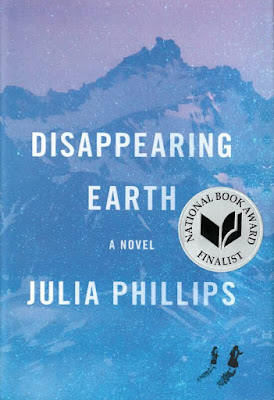I first heard about Disappearing Earth from a YouTube review. The summary definitely piqued my interest, so I picked it up at Barnes and Noble. Of course, I didn't read it right away, and in the time between when I bought it and now it's been nominated for several awards. I've been reading a lot of young adult and middle grades lately and I figured it was about time to break that up with a grown up book. So, I finally started on this one, hoping to maybe find a new favorite, or at least appreciate some award-worthy writing.
The novel is set in Kamchatka Peninsula in Russia, a remote spot on the northeastern edge of the country. As the story begins, two young sisters, ages eight and eleven, go missing. Their disappearance rocks their small community and stirs up latent feelings of sexism and racism against the different indigenous groups that live there. Fear and suspicion spread like wildfire as more and more time passes without a resolution. The sisters seem to have disappeared without a trace, and the police have no useful leads. Each chapter in the book switches perspective to a different person that the mystery of the girls has touched, and all these separate stories come together in the end to present a more full picture of what happened.
I feel split about this novel. I liked it overall and thought it was beautifully written. I liked how Phillips wove in messages about the racism and discrimination that indigenous people face and the remote setting was interesting to explore. The emotions of the characters felt deep and genuine, and the question of what happened to the girls was very engaging and kept me turning the pages. Despite all that though, I can't deny that I was often bored while reading this. Every chapter switches to a new set of characters, and a lot of their stories have almost no connection to the mystery the novel revolves around. Most of the people that narrate are only connected through a relative that knows someone or through having heard the story on the news. While they are able to draw connections to the missing girls through their different life experiences, many of those connections are not in service of solving the mystery. This is fine, but it made for a slow reading experience filled with "slice of life" type information that wasn't always very interesting and didn't really go anywhere. It was also difficult to remember who was who as the story went on. The Russian names and nicknames were challenging for me to recall within individual chapters, and having several more introduced with each new chapter was tough. On the rare occasions when these characters crossed paths, I found myself having to look back a lot to remember where I had seen that name before, which interrupted my flow.
So obviously, I didn't really love the individual chapters in the novel, but when I look back over the work as a whole and consider how everything resolves, I do appreciate it. Phillips wove together a complicated web of connections surrounding the central mystery, and she does have important things to say about indigenous people, family, grief, and love. I can see why this novel is highly regarded, and I did enjoy many aspects of it. It just wasn't a special favorite for me. I would have liked a tighter focus on solving the disappearance of the girls, but that wasn't the story Phillips was writing. Disappearing Earth is actually about a lot of things, and readers that enjoy deep dives into the emotional lives of characters will probably really like this one. I'm happy to have finally given it a try.




No comments:
Post a Comment
So, what do you think?